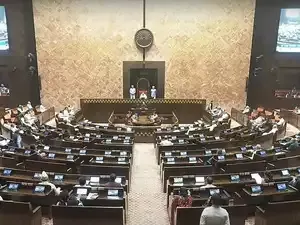After a three-year delay, the Aviniation Minister Ram Mohan Naidu moved the Protection and Enforcement of Interests in Aircraft Objects Bill in the Rajya Sabha for consideration on Friday.
The bill, approved by the Union Cabinet in January 2025, empowers aircraft leasing companies to repossess planes if airlines fail to pay lease rentals.
Once enacted, the bill is expected to align Indian law with international aviation standards and provide stronger protections for lessors, improving the investment climate for aircraft leasing in India.
As such, the bill provides greater legal protection to such companies by prioritising the Cape Town Convention over local laws, especially the Insolvency and Bankruptcy Code (IBC) of 2016.
This ensures that, in case of disputes, the international convention takes precedence.
Key provisions of the Bill
Urgency after Go First airlines case
The bill's urgency arose after a ruling by the National Company Law Tribunal (NCLT) in the Go First Airlines case.
The NCLT imposed a moratorium that hindered lessors from repossessing their planes, leading to lengthy legal battles. This resulted in increased leasing costs for other airlines and reduced confidence among lessors, who are backed by major banks and financing firms.
Lessors faced difficulties in reclaiming aircraft from Go First, months after the airline filed for insolvency.
The Aviation Working Group (AWG), a global aviation leasing body, also downgraded India's status in the light of these developments.
This situation called for the need for stronger legal protections for lessors in India.
Ministry of Corporate Affairs response
To address these issues, the Ministry of Corporate Affairs issued a notification exempting aircraft and aircraft engines from the mandatory moratorium.
The Insolvency and Bankruptcy Board of India’s data revealed that the average time for resolving insolvency cases is over 600 days, complicating the recovery of assets like aircraft.
Meanwhile, although India ratified the Cape Town Convention in 2008, there was no domestic law to enforce its provisions, causing conflicts with local regulations. This gap had limited the Convention's effectiveness in protecting lessors, despite India’s international commitment.
The bill, approved by the Union Cabinet in January 2025, empowers aircraft leasing companies to repossess planes if airlines fail to pay lease rentals.
Once enacted, the bill is expected to align Indian law with international aviation standards and provide stronger protections for lessors, improving the investment climate for aircraft leasing in India.
As such, the bill provides greater legal protection to such companies by prioritising the Cape Town Convention over local laws, especially the Insolvency and Bankruptcy Code (IBC) of 2016.
This ensures that, in case of disputes, the international convention takes precedence.
Key provisions of the Bill
- Reduced moratorium period: The bill reduces the moratorium period for lessors trying to reclaim aircraft during insolvency proceedings to a maximum of 40 days, shorter than the global standard of 60 days.
- Clearing outstanding dues: Lessors recovering their aircraft must clear pending charges like airport fees and oil company dues for up to 60 days.
Urgency after Go First airlines case
The bill's urgency arose after a ruling by the National Company Law Tribunal (NCLT) in the Go First Airlines case.
The NCLT imposed a moratorium that hindered lessors from repossessing their planes, leading to lengthy legal battles. This resulted in increased leasing costs for other airlines and reduced confidence among lessors, who are backed by major banks and financing firms.
Lessors faced difficulties in reclaiming aircraft from Go First, months after the airline filed for insolvency.
The Aviation Working Group (AWG), a global aviation leasing body, also downgraded India's status in the light of these developments.
This situation called for the need for stronger legal protections for lessors in India.
Ministry of Corporate Affairs response
To address these issues, the Ministry of Corporate Affairs issued a notification exempting aircraft and aircraft engines from the mandatory moratorium.
The Insolvency and Bankruptcy Board of India’s data revealed that the average time for resolving insolvency cases is over 600 days, complicating the recovery of assets like aircraft.
Meanwhile, although India ratified the Cape Town Convention in 2008, there was no domestic law to enforce its provisions, causing conflicts with local regulations. This gap had limited the Convention's effectiveness in protecting lessors, despite India’s international commitment.








